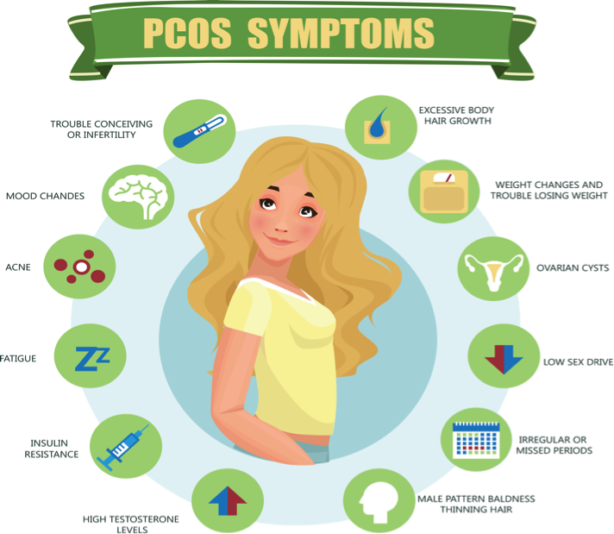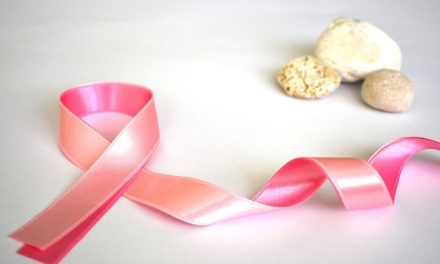Polycystic ovarian syndrome, also known as PCOS, is a chronic condition associated with hormonal imbalance. Poly means many, cystic implies presence of cysts over ovaries and syndrome implies presence of multiple associated symptoms. In this condition, the ovaries stop responding to normal hormonal cues from the master gland of the body i.e. the Pituitary Gland and instead of rupturing to release an egg, they continue to grow and become cysts
Who gets it?
PCOS affects about 1 in 10 women in the child- bearing age group (15 to 45 years). Females with relatives affected with it are more likely to be suffering from it.
How would I know if I have it?
If you are in the child- bearing age group and are suffering from any or all of these symptoms, you would need to be evaluated for PCOS:
- Irregular periods
- Acne
- Hair loss from scalp
- Unwanted hair growth over face or other body parts
- Skin tags
- Dark skin patches
- Weight gain
- Infertility
- Miscarriage
PCOS is a syndrome complex ranging from mild disease in which there may be no symptoms at all or just 1 of the above symptoms to severe disease in which you may have all the associated symptoms.
(Image courtesy https://blog.cysterwigs.com/introduction-to-polycystic-ovarian-syndrome-pcos/)
Why do these symptoms occur?
In PCOS, our ovaries are covered with multiple cysts that release various hormones such as testosterone, progesterone, prolactin, insulin etc. These hormones are responsible for causing the above symptoms in our body.
It may also be associated with raised blood pressure, cholesterol and blood sugar levels.
Does PCOS affect my ability to become pregnant?
Yes, the hormonal abnormalities taking place in the body, not only affects the ability to conceive but to also carry a baby to term.
PCOS & Skin
Disease activity in PCOS is very closely related to skin symptoms.
- Adult acne, not responding to conventional treatments, is one of the major predictors of PCOS and has to be evaluated thoroughly. Your skin may have been absolutely clear during teenage but with PCOS you could be getting bad eruptions on the face in your late 30’s or 40’s.
If this sounds like your story, don’t worry, there are various treatment options available these days which will help you clear your skin like magic! Just see your dermatologist at the earliest before these eruptions turn into marks and scars.
- Hirsutism or unwanted hair growth over the face or the body which is more than what would be expected in you because of your genes, is another predictor of PCOS. It could be of recent onset or can be there since long.
The ideal way to manage hirsutism in a case of PCOS is to do multiple (8-10) sessions of Laser hair reduction along with treatment of the hormonal imbalances. Laser can only remove the follicles active at present but cannot stop future follicles from getting active because of the hormonal fluctuations. Therefore, if your have gotten more than 10-12 sessions of Laser hair reduction but your growth just doesn’t seem to be reducing, then discuss with your treating dermatologist and get yourself evaluated for hormonal abnormalities.
- Hair loss– This condition is also known as Androgenetic Alopecia or Female pattern hair loss. In this, Hair thinning begins at the parting on the crown of the head and gradually spreads to involve most of the top of the head so that the scalp starts being visible. Eventually, this hair loss can become severe leading to near baldness. Hair thinning from PCOS is treated by orally and/or topically taking anti-androgens and topical minoxidil solutions.
- Pigmentation– PCOS can lead to formation of dark thick patches over the neck, underarms and thighs. This is also known as Pseudoacanthosis nigricans. These are usually treated with medicated creams, peels and oral antiandrogenic medications.
How is PCOS diagnosed?
PCOS is usually diagnosed by an ultrasound of your pelvis and blood tests for raised hormone levels such as serum Testosterone, DHEAS, Anti-Muellerian Hormone, LH:FSH ratio etc. These tests may come out to be normal in mild cases but need to be observed and repeated regularly.
How can PCOS be treated?
PCOS is considered to be a lifestyle disorder. Approaching PCOS and skin issues requires a multi-level approach. You should avoid avoid sugars, refined carbohydrates, trans fats, dairy, and non-organic meat.
Mild disease may not require any medications but only a change in our lifestyle in the form of healthy diet, exercise, avoidance of alcohol and smoking, whereas, a more severe form would require you to take hormonal treatment for a period of time. Since it is a chronic disorder, long term follow up and maintenance is required. However, that does not mean that you will be taking hormonal pills throughout your life.
What next?
To make a decision on the best line of management to help you you’re your health and skin and hair related, discuss your options with your dermatologist and gynaecologist. They will formulate the best treatment plan and help you get the best quality health care.






Hello everyone, I am Stephanie Sally. I am from Britain. I want to write this testimony to tell others and thank Prophet Odunga for what he has done for me. I am married for 12 years now and i have given birth to 5 children but they all died within days and i was called all sort of names by my mother-in-law and this has made my marriage life very hectic and a burden of sorrow. I contacted Priest Odunga for help and i will say that he is a very strong spell caster and he indeed help me solve my problem. I saw his email in a testimony and i contacted him, little did i know it would be the end of all my problems. My husband even loved me more and bought me expensive things. One afternoon, i felt my womb moving and after 9 months i gave birth to a baby boy and now my boy is growing up. Ever since i contacted Prophet Odunga, my story has been different. Please, contact him at odungaspelltemple@ gmail. com or WhatsApp/Call +2348167159012 to help you